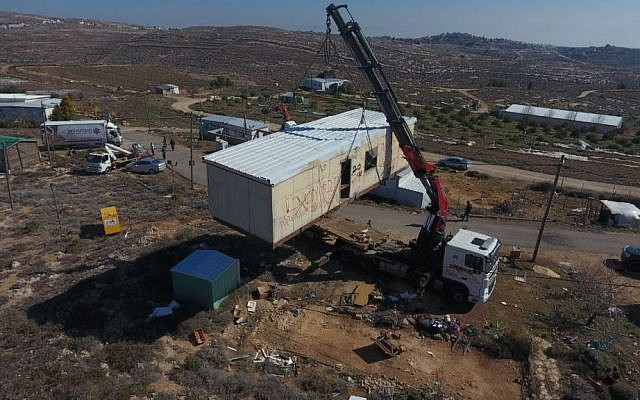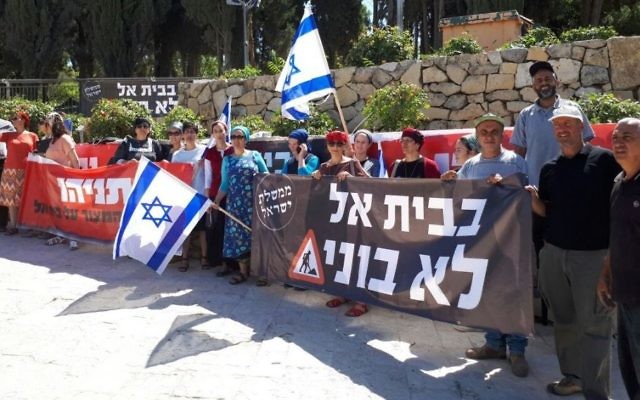Second day of meetings sees 1,323 units across West Bank okayed, including for evacuees of Migron and Amona outposts; settlers protest outside PM’s residence

AMICHAI, West Bank — The Defense Ministry body responsible for authorizing settlement construction advanced plans for some 1,300 West Bank homes Wednesday, capping off a week which saw the green-lighting of over 2,600 homes.
Included in the plans that gained final authorization for building by the Civil Administration’s High Planning Subcommittee were projects for the evacuees of the illegal Migron (86 units) and Amona (102 units) outposts.
The two communities were demolished in September 2012 and February 2017, respectively, after the High Court of Justice ruled they had been built on private Palestinian land.
Also among the 1,232 West Bank housing units advanced by the Civil Administration subcommittee Wednesday were 459 homes in Ma’ale Adumim.
While the plan gained what is referred to as “validation,” — typically the final approval required before construction can begin — the settlement city’s size requires it to go through an additional stage where the homes are marketed by the Housing Ministry to private contractors who are then responsible for carrying out the construction.
But despite the advancing of plans for some 1,300 settlement homes for the second day in a row by Netanyahu’s government, settler leaders staged a press conference outside his Jerusalem residence on Wednesday, demanding an improvement in West Bank infrastructure to prevent future terror attacks.

Four chairmen of regional and local settler councils were joined by members of bereaved families who lost loved ones in terror attacks that took place on West Bank roads.
Threatening to stage a sit-in outside the Prime Minister’s Residence in the next two weeks if funds were not immediately allocated for what they referred to as “security necessities,” the bereaved family members and settler leaders specifically called for the installation of cameras along roads throughout the West Bank, the installation of cell phone towers to improve reception for settlers who may need to call for help, and the paving of bypass roads around Palestinian towns and settlements to allow the populations to avoid each other.
Hadas Mizrachi, whose husband Baruch was gunned down in an attack near Hebron while en route to a family Passover Seder in April 2014, said that the terrorist admitted during his trial to have “specifically looked for a place to carry out the shooting where there was no phone reception.”

“We have reached a place of serious distrust with our government. Two years ago, we were promised these security improvements, and since then, there have been more attacks and nothing has changed,” Samaria Regional Council chairman Yossi Dagan said frustratingly.
On Tuesday, an official in Defense Minister Avigdor Liberman’s office confirmed the ministry’s intention to roll out a security package for West Bank settlers next month worth NIS 3.3 billion ($939 million). The package is expected to include many of the demands raised by the settlers and bereaved families outside the Prime Minister’s Residence on Wednesday.
While Dagan said he was pleased to have learned about the plan, he emphasized that funds for it still had not been allocated. “Security is not ensure through these announcements, but through actions,” he said.
“If we do not see real change in the next week or two, I will return here [to protest] with my children because this is the only way to prevent the next attack. I am now raising five children on my own and nobody else should have to go endure what I have,” said Mizrachi, representing the bereaved families present.
But Liberman emphasized that such infrastructure improvements take time. Speaking to reporters Thursday at the construction grounds of the new Amichai settlement for Amona evacuees, the Defense Minister assured that his office is working to gather the money for the West Bank security project.
“These things don’t happen overnight, but this security package is the first all-inclusive one that will address a broad range of needs for residents in Judea and Samaria,” Liberman said, referring to the West Bank by its biblical names.

All together, 2,646 housing units were advanced this week by the Civil Administration; 1,323 homes were given final approval for building.
Included in the 1,292 green-lighted Tuesday were 562 units located outside the so-called “settlement blocs” that Israel has vowed to retain under any future peace deal, with mutually agreed land swaps with the Palestinians. Among them were plans that gained final approval for settlements that lie deep in the West Bank, such as Nokdim (146 units) and Rehelim (97 units). This is in addition to projects in Tomer (55 units) and Maskiot (27 units) that are in the Jordan Valley.
Also among Tuesday’s approvals were 17 temporary homes for the residents of the illegal Netiv Ha’avot outpost, which is slated to be razed in March.
The homes will be located just outside the Alon Shvut settlement in the Gush Etzion bloc south of Jerusalem, but they will only be permitted to remain for three years.
In addition to the 2,646 housing units advanced through planning stages were 296 homes that gained approval from the Civil Administration to be marketed for sale in Beit El, thus fulfilling a promise that Prime Minister Benjamin Netanyahu made to the evacuees of the settlement’s illegal Ulpana outpost, which was razed in 2012.
On Monday, a separate Defense Ministry body — the Civil Administration’s Licensing Subcommittee — granted building permits building permits for 31 housing units for the Jewish settlement in Hebron.
This was first time in 15 years that Israeli construction has been approved in the flashpoint West Bank city and was seen as an Israeli response to the recent decision by the United Nations Educational, Scientific, Cultural Organization (UNESCO) to list Hebron’s Old City as an endangered Palestinian world heritage site.

Nonetheless, Hebron’s Palestinian municipality is expected to petition against the decision in the coming weeks, claiming to have a protected tenancy status over the land in question.
Defense Ministry officials say a total of roughly 12,000 housing units will be passed through various stages of approval this year, four times the amount in 2016.
In a response to the plans for settlement homes advanced on Tuesday, the European Union called on Israel to reconsider.
“The European Union has requested clarifications from Israeli authorities and conveyed the expectation that they reconsider these decisions, which are detrimental to ongoing efforts towards meaningful peace talks,” an EU statement said.
The bloc voiced particular concern about proposals for Hebron and about the start of preparatory groundwork in the east Jerusalem neighborhood of Givat Hamatos.
Construction in Givat Hamatos would “severely jeopardise the contiguity and viability of a future Palestinian state”, the EU said, adding that it would continue work with international and regional partners to try to restart dialogue.

A spokesman for Palestinian Authority President Mahmoud Abbas condemned on Tuesday the latest batch of settlement homes that were advanced by Israel through various stages this week, saying they were in violation of United Nations Security Council resolutions.
“This settlement assault comes at a time when the administration of US President Donald Trump is exerting effort and creating the conditions that will pave the way for making a real peace,” Nabil Abu Rudeineh said.
Speaking with The Times of Israel, a White House official struck a more mild chord. “President Trump has publicly and privately expressed his concerns regarding settlements and the administration has made clear that unrestrained settlement activity does not advance the prospect for peace.”
“At the same time the Administration recognizes that past demands for a settlement freeze have not helped advance peace talks,” the official concluded.
While in the early days of the Trump administration the White House insisted that settlements were not “an impediment to peace,” during Netanyahu’s visit to Washington in February, the president told the prime minister that he’d like him to “hold back on settlements for a little bit” and said in a Hebrew newspaper interview that settlements are “not a good thing for peace.”
AFP contributed to this report.



@ Edgar G.:
I forgot to mention that thr apartments in Holon which were “available” and which brought us from Vancouver Island more than half way around the world, had not even had a spade dug into the ground to start building. I discovered that from Sara Ya’ari when taking with her, or actually listening to her…..after which we walked out in disgust. I didn’t even bother asking her where she was when we arrived at her desk at the beginning of our trip around Tel Aviv looking for her…. Probably in the washroom.
@ sabashimon:
Me and family came to Israel because they sent us a telegram saying that there were available apartments in Holon. We found that there were none. The so-and-so at the office we needed to go to, said..”…weeelll…… available…..doesn’t mean definite….”
It was over 40 years ago and I remember it like yesterday. There were no flags not kisses to meet us..NOTHING. when we wne to the office address, it was a coulter with about 4 desks in a line behind it. One guy said …”she’s in Jerusalem today”, but fo to this other address….we went, and were sent yet agai to another address…. To shorten the story, we, cpmplete strangers, 1st time ever in Israel, spent 3 hours looking from address to address, walking in the unaccustomed heat etc. We landed up at the exact same original first address and Mazaltov, Sara Ya’ari finally was there, no mention of Jerusalem. And told us the bad news.
So it was goodbye, stay in a hotel and look for a private apartment…
And we were swindled on that too. .. Our Shaliach was a condemned illiterate “jobs for the boys” cretin, living it up in London, where I had to travel to track him down because he ignored my letters from Ireland, which he also was supposed to cover. When he came there, he stayed with a relative, but sent in bills for expensive hotels..
I had a little influence there too, I had relatives. Our story was spread all over the full 2 middle pages of L’Isha………. The shaliach sued both them and us, but I never heard any more about THAT. it was headed “The Cause of Poor Aliyah is the Shalichim.”.
Jobs for the Boys…the Labour Govt. at it’s best…
@ LtCol Howard:
It was someone with 2 left hands, no opposable thumbs, prehensile feet, who travelled through trees although the ground was there, and had not yet learned to say words……
excpet, “how much is it worth to you…”, and “we’ll get back to you in 10 years…if you remind us’ ……
Just another instance of Lucy pulling away the football at the last moment. Anyone here who still believes there is a correlation between “approvals” and actual building is welcome to buy the bridge I have for sale in the Negev.
Kvar raeenu et haseret hazeh lo p’am v’lo p’amaeem
@ LtCol Howard:
It is clownish bureaucracy. Israeli housing is expensive in great part because of too much government in the housing market.
@ david melech:The current system of housing approvals had to be designed by a insane enemy of Israel. It leads to multiple announcements which draw condemnations; multiple revisions which increase the PR problem and lead to disillusion among the Israeli public; multiple cancellations which smack of political betrayal; etc. instead, the role of the Israeli government should be to establish building safety codes (plumbing, electrical, load bearing, etc.). Local communities should establish zoning. Then any builder who has the financing and desire should be issued building permits. This will relieve the pressure on housing, reduce prices for housing and place the responsibility for sensible building decisions where it should be, at the local level, in the hands of the people.
Guess an election is in the wind!